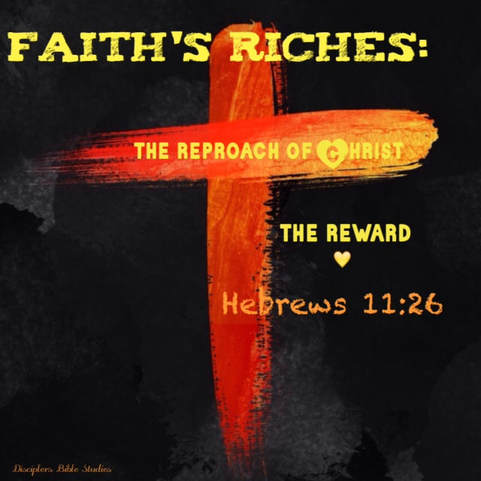 From the time Moses led the Hebrew people out of Egypt and delivered them safely to the borders of the Promised Land, he was one of the most honored and respected patriarchs among the people of Israel. After Jesus Christ and David, he is the most mentioned person in the Bible. For the Jews who lived during New Testament times, Moses’ words and commands were solemnly esteemed and observed. Moses is mentioned seventy-nine times in the New Testament, more than any other Old Testament person, and Jesus referred to Moses and the Law of Moses numerous times in His teachings. So it is no wonder the writer of Hebrews, in encouraging the faith of early Jewish believers in Christ, held Moses up as an inspirational example. We have seen in Hebrews 11:24-25 that by choosing ill treatment with the people of God over the passing pleasures of sin, Moses’ faith was evident. The writer goes on to tell us in 11:26 that Moses considered the reproach of Christ greater riches than the treasures of Egypt; for he was looking to the reward. Stop and think about this statement for a moment. To Moses, the reproach of Christ was greater riches than the treasures of Egypt! What an astounding testimony to Moses’ faith! Of all the treasures he could have had as the adopted son of Pharaoh’s daughter, Moses turned his back on them all and chose the reproach of Christ, something most people would not consider a treasure at all. But Moses was familiar with God’s promises and he believed them. He believed and clung to God’s promise that He would make Israel a great nation, that He would bless them as a nation, and that through them all the families of the earth would be blessed (Genesis 12:2-4; 17:4-6; 18:18; 26:4; 28:14; 46:3; Deuteronomy 26:5-9). So when the writer of Hebrews says that Moses chose the reproach of Christ, it means that Moses identified himself with the promises of God, with the people of God, and the purpose of God through Jesus Christ. Of course, Moses and his generation lived long before Christ, but throughout their history the people of Israel were the people of Christ, for they looked forward to the promise of the Messiah who was to come. Every law they followed and every sacrifice they made was a reminder of that promise, and Moses was one who longed for and lived for the fulfillment. He demonstrated that by the choices he made, and by faith he became a part of God’s plan in leading His people out of Egypt to the Promised Land where that promise would be fulfilled. Identification with the people of God was not a positive thing in the eyes of the world. The Hebrew people were disdained by the Gentile nations, including the Egyptians, particularly because of the covenant of circumcision they had made with God. That is why we see in Joshua 5:9, after the Israelites entered the Promised Land and the children of the wilderness wanderings were finally circumcised, the Lord told Joshua, “Today I have rolled away the reproach of Egypt from you.” Moses was not a shortsighted man. He was not one who looked for instant gratification or for approval from the world he lived in. He looked past the reproach. He looked past the indignity of slavery in Egypt to freedom, to the inheritance of the Promised Land, and ultimately to the heavenly reward. His faith was not in things he could see and touch and taste (Hebrews 11:1). His faith went beyond the promise of the inheritance in the land. Moses looked to the exceeding great reward (Genesis 15:1; Numbers 18:20; Psalm 58:11). For other encouraging Bible passages concerning the reward, see Matthew 25:21; Romans 6:3; Philippians 3:14; Colossians 3:23-24; James 1:12. By faith, Moses understood that the reproach was temporary and that an eternal reward lay ahead. In a small way, Moses shared in the sufferings of Jesus Christ who left the privileges of glory, came to earth as a human baby, indentified with the suffering of His people, and bore the reproach of rejection and death on the cross. The New Testament admonishes us to look past the reproach of the world also. Jesus called all who would be His disciples to “take up your cross daily and follow me “(Luke 9:23). The apostle Peter tells us we were called for a purpose: Jesus is our example and we are to follow in His steps (1 Peter 2:21). So what is your greatest treasure? Who are you following? What reward are you seeking? Who is your example? These are some of the questions Moses, Peter, and Jesus might call us to consider today. With love ~Suzie
0 Comments
Leave a Reply. |
SUZIE KLEIN
I have been involved in Disciplers since 1987, as a discussion leader, teacher, writer, and now as director. I am profoundly committed to the stewardship of this ministry which God has entrusted to me for a time. God’s word is the chief joy of my life. I cherish my personal time in the word, and I am filled with gratitude to be able to share His word with you, my fellow disciples in Christ. Categories |

 RSS Feed
RSS Feed